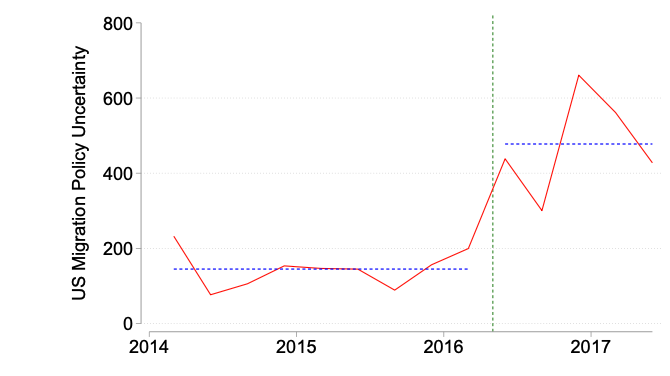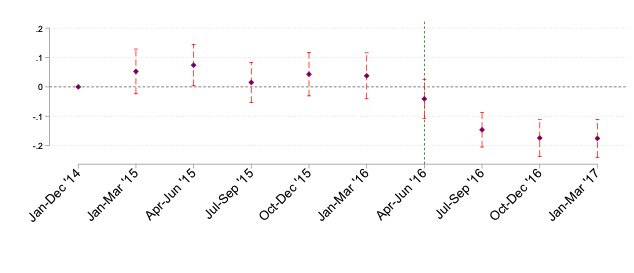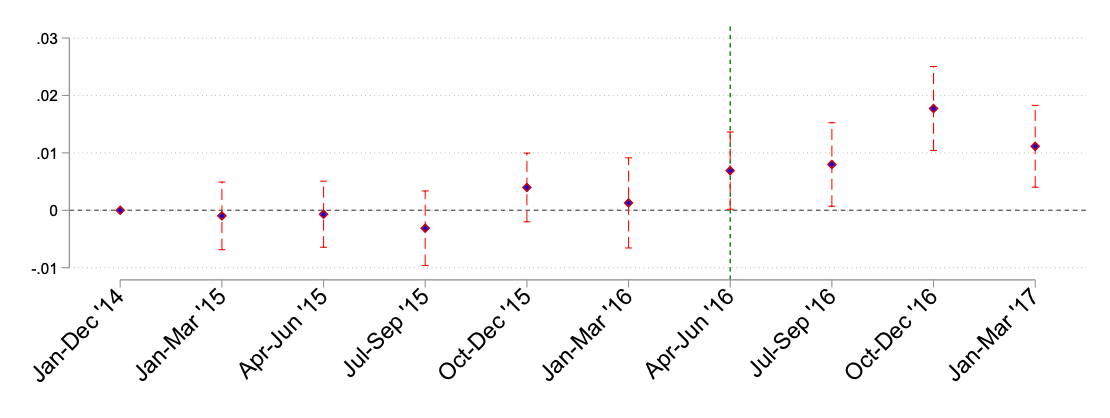
Increased uncertainty in India around US immigration policies led to firms relocating jobs from the US to India. Increasing rhetoric around restrictive immigration policy may increase offshoring, rather than promote domestic employment.
The last decade has witnessed a significant flux in immigration policies around the world. There has been an unprecedented rise in migration policy uncertainty in advanced nations, particularly the United States, UK, France, and Germany (see Figure 1 for the US). It is evident that during this period concerns regarding the displacement of native workers by immigrants have amplified.
Rising uncertainty about immigration policy in the US
Traditionally, the debate around immigrants replacing native workers has been focused on lower skilled immigrants. Under President Trump's administration, immigration policy uncertainty escalated even for skilled immigrants. For instance, the US H-1B visa programme (temporary high-skill work visas that require applicates to possess at least a US-equivalent bachelor’s degree) was a focal point of President Trump's speeches from his campaign days right up to the Oval Office. During his campaign, Trump firmly stated his commitment to curbing H-1B visa "abuse," arguing that foreign workers were replacing Americans at lower wages. Such remarks became more frequent after his victory in the Republican primary of June 2016. While the H-1B visa quotas and other procedures remained unchanged between mid-2016 to March 2017, there was a sharp spike in migration policy uncertainty. In fact, the increase in migration policy uncertainty after June 2016 (three times higher than before Trump's primary win) was unprecedented with no other election year marked by such a rise.
Figure 1: Migration policy uncertainty

Notes: The figure plots quarterly Economic Policy Uncertainty Index for Migration (Baker Bloom and Davis 2016) for the US. The blue dotted lines represent the means for various periods: 145 in the pre-period January 2014 to March 2016 and 478 during the period April 2016 to June 2017. For further methodological details about the construction of the index see EPU Website. The vertical line corresponds to Trump’s win in the Republican primary in June 2016.
Estimating the impact of increased immigration policy uncertainty on the demand for India-based workers
Theoretically, higher uncertainty leads firms to postpone investment decisions due to an increase in the option value of “waiting” (Bernanke 1983, Dixit and Pindyck 1994). In the context of H-1B hiring, rising uncertainty around visa policies may make firms hesitant to hire H-1B workers for US-based positions. Hiring workers under the H-1B programme entails significant upfront investments of both time and money. If firms are uncertain about the policy environment, they may delay H-1B hiring or consider alternative options to mitigate risks.
In our recent study (Chaurey et al. 2024), we examine the impact of this heightened uncertainty around H-1B immigration policy on the demand for India-based workers by both firms in the US (host country) and India (sending country). Indian workers account for a staggering 70% of these visas.
Using data from India's leading job platform for skilled workers, we first document that job listings for US-based positions on this platform nosedived by 15%, immediately after President Trump's primary win (Figure 2).
Figure 2: Impact on postings for US-based jobs

Notes: The figure plots the coefficients showing the quarterly trend in postings for US-based positions after accounting for firm level fixed effects. The vertical line corresponds to Trump’s win in the Republican primary in June 2016.
To capture the extent to which firms were affected by the uncertainty, we construct a measure of their H-1B dependence using the share of their total vacancies which were US-based on the platform before June 2016. We find that firms with a higher reliance on the H-1B visa programme increased their job listings for India-based positions after the increase in uncertainty (Figure 3). The estimates show for every 10-percentage point increase in a firm’s dependence on the H-1B visa there is an 11% increase in India-based job postings for that firm. Relatedly, an increase in uncertainty leads to a larger increase in Indian-based postings for firms that prior to 2016 had a higher share of US-based vacancies - a one-standard-deviation increase in uncertainty leads to a 5.3% increase in India-based postings for firms with a 10-percentage point higher share of US-based vacancies. For an average firm with 20.9 US-bsaed vacancies, these estimates translate into an increase in India-based vacancies by 15.8 for a decline in US-based vacancies by 4.1.
Figure 3: Impact on postings for India-based jobs

Notes: The figure plots the quarterly coefficients showing the impact on postings for India-based positions based on firms’ exposure to the shock (share of US based vacancies of all firm vacancies before June 2016). The vertical line corresponds to Trump’s win in the Republican primary in June 2016.
What explains the rise in India-based positions?
We further examine whether these were new jobs created in India or those relocated from the US to India by these firms? We find that occupations with a higher likelihood of being offshored saw a larger increase in job postings in India, for the same level of firms’ H-1B dependence. Furthermore, using balance sheet data we find that service exports by these firms surged by 4% for every 10 percentage point increase in H-1B dependence and there was no increase in posting in other countries after the heightened uncertainty. In contrast, domestic sales of these firms were unchanged. Taken together, these findings suggest that the increased job listings in India do not reflect firm expansion to fulfil domestic Indian demand but rather increased offshoring. Lastly, we find that firms headquartered in India, were twice as likely to increase India-based positions for the same exposure to the shock compared to US-headquartered firms.
Policy uncertainty influences firms’ hiring decisions
Our findings provide new evidence on the ongoing academic discussions on immigration and offshoring dynamics. While existing research suggests that immigrants and local labour are not easily interchangeable with offshored workers, our results suggest that firms can switch hiring location in occupations where this is possible.
More importantly, our findings underscore the role played by policy uncertainty on firms' hiring decisions even before any changes are made to the policy. We show how heightened immigration policy uncertainty without any de jure change in visa quotas, like that observed after Trump’s primary win, affects firms’ decision to hire in the host and sending countries. This suggests that in cases of widely debated policies, such as immigration, firms may adjust well in advance in response to rising uncertainty.
Given that uncertainty alone can explain a significant share of the change in firm behaviour, it is critical for researchers to understand the role of policy uncertainty especially when evaluating policies that spark significant public debate. For instance, in our context, the impact of migration policy uncertainty is about two-thirds the magnitude of the impact of the actual policy change in March 2017 under the Trump administration. More broadly, our results show one channel through which protectionist agendas, widely believed to benefit natives, can inadvertently end up achieving the opposite.
References
Baker, S R, N Bloom, and S J Davis (2016), “Measuring economic policy uncertainty,” The Quarterly Journal of Economics, 131(4): 1593–1636.
Bernanke, B S (1983), “Irreversibility, uncertainty, and cyclical investment,” The Quarterly Journal of Economics, 98(1): 85–106.
Chaurey, R, K Mahajan, and S Tomar, “Trumping immigration: Visa uncertainty and jobs relocation,” SSRN Working Paper.
Dixit, A K, and R S Pindyck (1994), Investment under Uncertainty, Princeton University Press.



